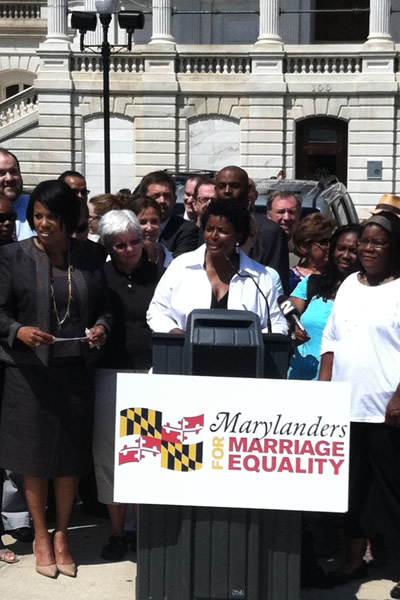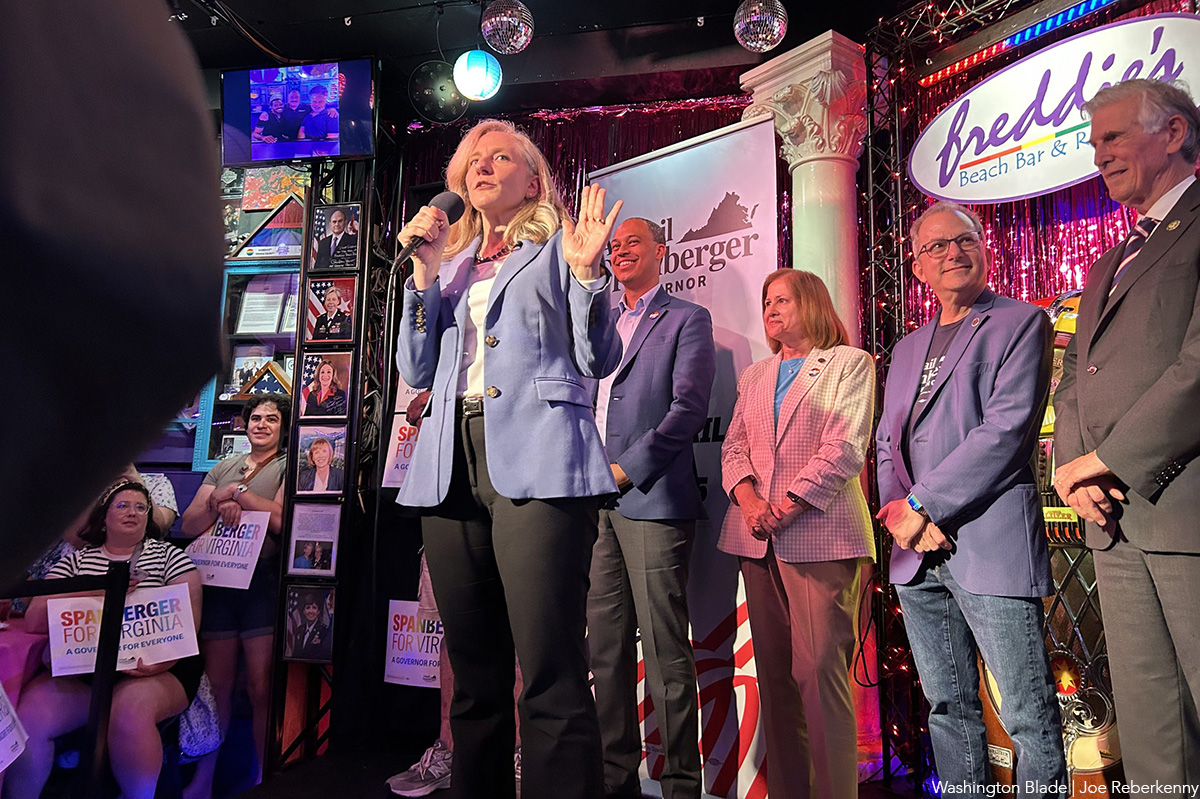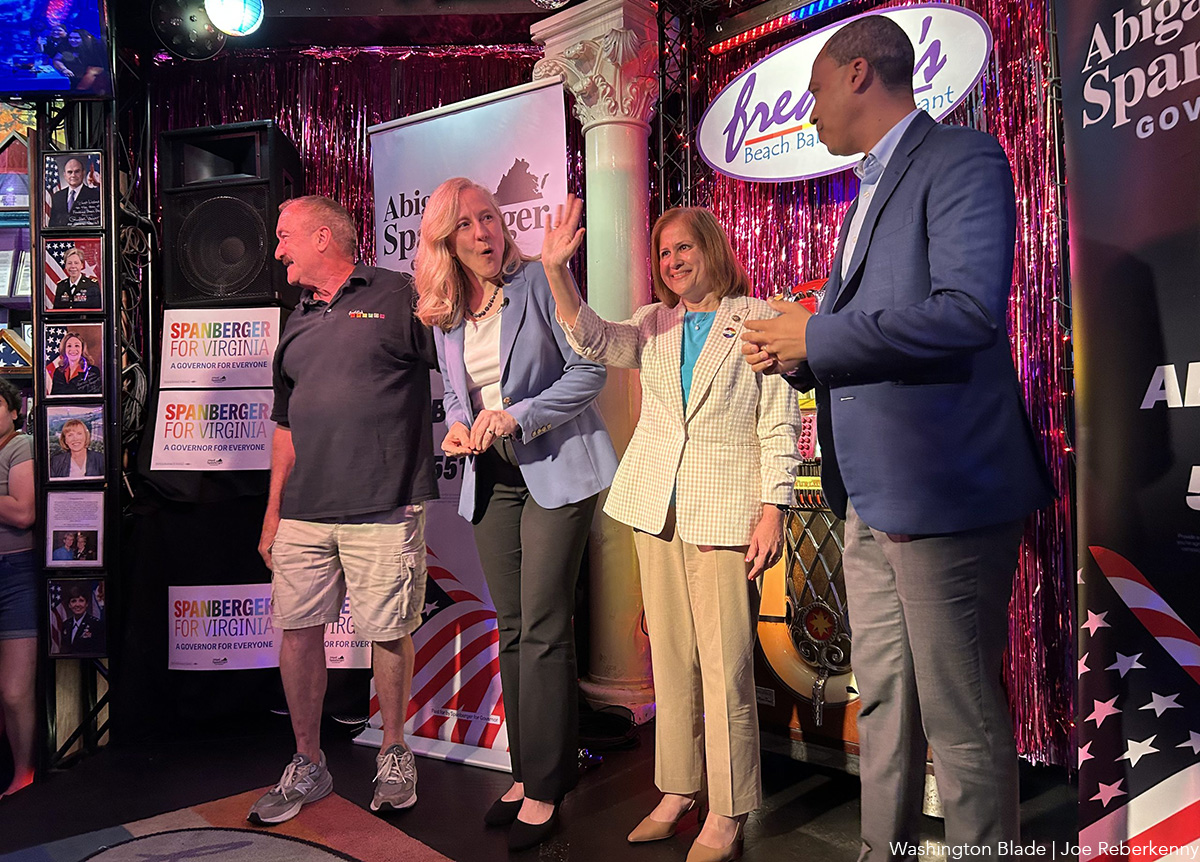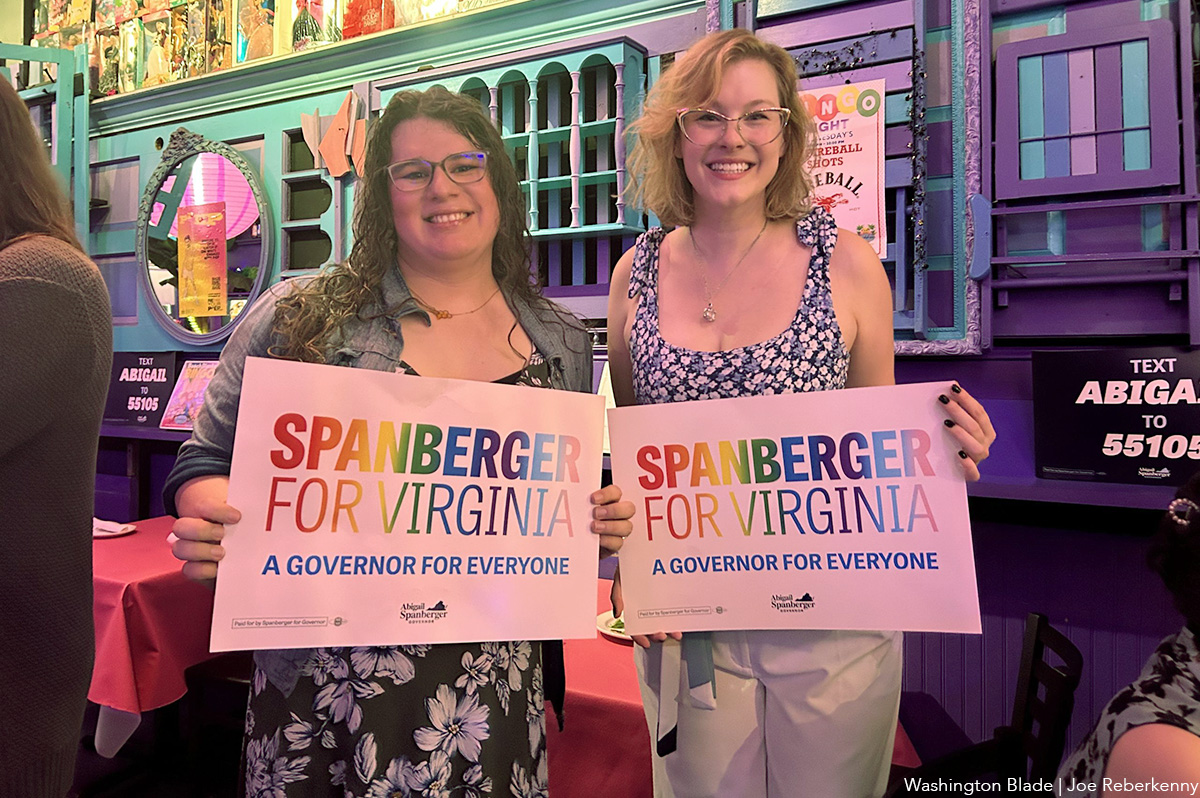Local
New effort to win marriage underway in Md.
‘We are not considering civil unions’


Del. Mary Washington (center), a lesbian member of the Maryland House of Delegates, announced plans for a new marriage bill at a news conference Tuesday. At left is Baltimore Mayor Stephanie Rawlings-Blake. (Washington Blade photo)
BALTIMORE — A diverse coalition of organizations announced plans Tuesday to push for a same-sex marriage bill in Maryland during the 2012 legislative session, which begins in January.
Led by Progressive Maryland, the coalition is dubbed Marylanders for Marriage Equality and includes Equality Maryland, the Human Rights Campaign, ACLU, Service Employees International Union 1199, Maryland Catholics for Equality and a number of other religious organizations.
Coalition members gathered at a sweltering morning news conference in front of Baltimore’s City Hall to announce their plans, just weeks after New York’s legislature approved a marriage equality measure.
“I believe in equality for all Baltimoreans,” said Mayor Stephanie Rawlings-Blake. “Baltimore will continue to stand with you in Annapolis.”
Sen. Rich Madaleno (D-Mont. Co.), when asked by the Washington Blade whether the coalition would consider a civil unions bill in lieu of marriage in the event of a referendum threat, said unequivocally that civil unions are an unacceptable compromise.
“It is marriage and only marriage — we are not considering a civil unions bill,” said Madaleno, the only openly gay member of the state Senate. “We will win a referendum if it gets that far.”
Gov. Martin O’Malley did not attend the news conference, but has said since 2007 that he would sign a marriage equality bill if the legislature can pass it. Del. Maggie McIntosh, a lesbian and the most senior member of the LGBT Caucus in the House of Delegates, said the coalition is in talks with O’Malley about taking a more visible and public role in advocating for the bill. O’Malley was criticized by some marriage rights supporters earlier this year for his perceived lack of visibility on the issue, which comes in stark contrast to New York Gov. Andrew Cuomo, who is widely credited with championing the issue in the Empire State.
McIntosh said marriage equality supporters have asked O’Malley to include the bill in the administration’s 2012 legislative package and that an answer on that request could come within weeks.
“The governor and the delegates have had discussions about this recently,” O’Malley spokesperson Raquel Guillory told the Blade after the news conference. “He is supportive of the new push and we are reaching out to a broad coalition of folks and discussing what steps we take next.”
Guillory didn’t say whether O’Malley would include the marriage bill in his administrative package.
“The governor was very clear last year that he would sign a marriage bill if it crossed his desk and that position has not changed,” she said. “He remains supportive.”
Asked why O’Malley didn’t attend today’s news conference, Guillory said, “This was an event organized by the delegates and [Rich] Madaleno — this was their event, it wasn’t the governor’s announcement.”
She added that the difference between the successful New York effort and the very visible role Cuomo played in it and O’Malley’s approach to the issue is merely a matter of style.
“You’re focusing on one issue,” she said, “you need to look at the personalities of the individuals. [Cuomo] is not much more out there [on marriage], he’s more vocal about everything, it’s a matter of style.”
She added that O’Malley “did a lot behind the scenes to work this bill,” and that taking Cuomo’s approach “doesn’t ensure passage.”
A marriage equality bill failed in the House of Delegates in March after the Senate approved it. Multiple factors were cited for its failure, including opposition from conservative black pastors in Prince George’s County and a vigorous and well-funded campaign by the anti-gay National Organization for Marriage to derail the bill.
But supporters noted that they had little time to plan last year, because the bill was bottled up in committee until a sudden reshuffling of committee assignments in December resulted in its Senate passage.
“I’m incredibly optimistic this time,” said lesbian Del. Heather Mizeur (D-Mont. Co.). “Last year, we were caught off guard; this year we have more time to plan.”
Responding to speculation that the bill could be introduced at a special October legislative session on redistricting, Mizeur said that the bill would most likely be considered in January.
Guillory said the focus of the October special session would be on redistricting. “Other options could be put on the table, but our focus is to take care of the redistricting issue,” she said.
Del. Peter Murphy (D-Charles Co.), who came out in an interview with the Blade earlier this year, echoed Mizeur’s confidence.
“I’m very optimistic,” Murphy said, “there is a tremendous effort and organization behind this and I’m confident the citizens of Maryland will support it.”
Rion Dennis, executive director of Progressive Maryland, vowed that Maryland would become the nation’s seventh state to enact marriage equality. His group is leading the marriage coalition. Sultan Shakir, an HRC employee who was loaned to Equality Maryland during the legislative session to work on marriage, is now working with Progressive Maryland.
Equality Maryland fired its executive director after the 2011 legislative session and its board chair later resigned. The group has been plagued by financial and staffing problems, but one board member said Tuesday that things are turning around.
“We have a six-month plan in place and are back on sound financial footing,” said Equality Maryland board member Mark Yost. “We look forward to working with the coalition to bring marriage to all Marylanders.”
Yost said Equality Maryland is planning to hire a new executive director but declined to say when that would occur.
In addition to politicians and activists, the Tuesday news conference highlighted the plight of two lesbian couples from Maryland. Kalima Young and Francine Housier joined Chris Megargee and Barbara McKeefery in addressing the media and taking about the importance of marriage equality to them and their families.
Maryland
Silver Spring holds annual Pride In The Plaza
‘Today means inclusion. It means to build resilience’

Silver Spring’s annual Pride in the Plaza event took place on Sunday to celebrate the LGBTQ community and emphasize inclusion and resilience.
“Today means inclusion. It means to build resilience, love,” Robyn Woods, program and outreach director for Live In Your Truth, which organized the event, said. “I mean, just being surrounded by the community and so many great entrepreneurs, business owners, and just being a part of this whole rainbow coalition that we call the LGBTQIA to be about.”
With the event being her first time organizing for Live In Your Truth, Woods said she felt emotional to see the support and love at the event.
“Some people (are) bringing out their children, their babies, their grandparents,” Woods said. “It’s a lot more allies here than anything else. That type of support to me means so much more than just support from my community; just outside support, inside support, so much support around it, so much love. Everyone’s smiling outside, helping each other.”
Attendees of the event were able to head over to the Family Fun Zone, an air-conditioned Pride Cool Down Lounge, or watch live drag performances in the main stage area.
Along with entertainment and a shaved-ice stand, rows of information tables stood along the plaza, including FreeState Justice, the Washington Spirit, Trans Maryland, Moco Pride Center, and the Heartwood Program, an organization that offers support, therapy, education, and resources to the LGBTQ community.
“I want people to know about our services, and I love what we have to offer,” Jessica Simon, psychotherapist for Heartwood Program’s Gender Wellness Clinic, said. “I (also) want to be part of a celebration with the community, and so it feels good to be here with other people who have something they want to give to the community.”
She added that within today’s political climate, to which she called an “antidote to shame,” it’s important to be celebrating Pride.
“There’s a lot of demonization of LGBTQI people,” Siena Iacuvazzi, facilitator for Maryland Trans Unity, said. “(Pride) is part of the healing process.”
Iacuvazzi said she was taught to be ashamed of who she was growing up, but being a part of a community helped her flourish in the future.
“I was taught how to hate myself. I was taught that I was an abomination to God,” she said. “But being a community is like understanding that there are people who have experienced the same thing, and they’re flourishing. They’re flourishing because they’re willing to stand up for themselves as human beings and discover themselves and understand what’s true for themselves.”
She added that Pride allows for a mutual understanding to take place.
“It’s more of a sense of belonging … and just taking that home and understanding you’re not alone,” Iacuvazzi said. “We’re each taking our own journey — we’re not putting that on each other. It’s just walking away with a sense of belonging and humanity.”
Similar to Iacuvazzi, Woods said she hopes attendees’ biggest takeaways would be family, fun, resilience, and pride.
“Being proud of yourself, being happy for who you are, and representation and how much it matters,” she continued. “And I think all these young people that are walking around here get to see versions of themselves, but older. They get to see so many different lesbian, gay, bisexual, pansexual people that are successful, that are showing love, that care, and it’s not how we’re portrayed in the media. It’s lovely to see it out here. (It’s) like we’re one big old, happy family.”
Virginia
Spanberger touts equality, reproductive rights in Arlington
Democratic Va. gubernatorial nominee made campaign stop at Freddie’s Beach Bar

With the general election heating up and LGBTQ rights under increasing threat nationwide, Virginia gubernatorial candidate Abigail Spanberger brought her “Span Virginia Bus Tour” to Arlington’s Freddie’s Beach Bar for a campaign stop filled with cheers, policy pledges, and community spirit.
Spanberger, who served three terms in the U.S. House of Representatives from 2019 through early 2025 for Virginia’s 7th Congressional District, also served as a federal law enforcement officer specializing in narcotics and money laundering cases, and as a CIA case officer working on counterterrorism and nuclear counterproliferation.
Spanberger is running against Republican nominee Winsome Earle-Sears, the current lieutenant governor of Virginia, who said she was “morally opposed” to a bill protecting marriage equality in the commonwealth.
She was joined by other Democratic candidates and supporters: lieutenant gubernatorial candidate Ghazala Hashmi, attorney general candidate Jay Jones, Virginia state Sen. Adam Ebbin (D-Alexandria), and Congressman Don Beyer.

Freddie’s was packed wall-to-wall with supporters, many of whom wore “Spanberger for Virginia” shirts in the progressive Pride flag colors. In her speech, she made it clear that LGBTQ Virginians’ rights are on the ballot this year.
“I’m so excited to be here, and I am so grateful to the entire staff of Freddy’s for letting us overtake this incredible venue that is not just an awesome place to come together in community, but is a symbol to so many people of joy, of happiness, of community and of celebrating our friends and our neighbors,” Spanberger told the packed restaurant. “It is exciting to be here, and particularly during this Pride month, and particularly as we reflect on the 10-year anniversary of Obergefell and the reality that we still have so much work to do.”
“The reality is there are so many people who still would be inclined to take us backwards,” she said. “In this moment when we see attacks on people’s rights, on people’s humanity, on Virginia, on our economy, on research, on public education, on food security, on health care, on Virginians, on their jobs, on public service and on people — it can get heavy.”
“What it does for me is it makes me want to double down, because once upon a time, when I was talking to my mother about some horror show or sequence of activities coming out of a particular administration, she did not really have the patience to listen to me and said ‘Abigail, let your rage fuel you’ — and the conversation was over. And so I reflect on that, because, in fact, every day there is so much fuel to be had in this world and in this moment.”
One of the points Spanberger continued to emphasize was the importance of steadfast state government officials following the election of President Donald Trump, which has led to rollbacks of LGBTQ and bodily autonomy rights as a result of the conservative-majority U.S. Supreme Court.
“What the past few years have shown us is that a Supreme Court decision, no matter how many years we have celebrated its existence, does not protect us in the long term. And so as governor, I will work to make sure that every protection we can put in place for the dignity, the value, and the equal rights of all Virginians is a priority.”
During her speech, Spanberger highlighted several of the key values driving her campaign — protecting reproductive freedom and human rights, lowering healthcare costs, safeguarding Virginia’s environment, and ensuring that public education is affordable, accessible, and rooted in truth, not politics.
Spanberger went as far as to say that she wants to amend the state’s constitution to remove Section 15-A. “The reality is that in Virginia, we still have a ban in our state constitution on marriage equality. It is of the utmost urgency that we move forward with our constitutional amendment.”
“We will work to ensure that that terrible constitutional amendment, that was put in years ago, is taken out and updated and ensuring that Virginia is reflective in our most essential documents of who we are as a commonwealth, which is an accepting place that celebrates the vibrancy of every single person and recognizes that all Virginians have a place, both in that constitution and in law,” she added.
Following the event, two supporters spoke to the Washington Blade about why they had come out to support Spanberger.
“I came out because I needed to show support for this ticket, because it has been a particularly rough week, but a long few years for our rights in this country, in this state, with this governor, and it’s — we need to flip it around, because queer people need protection,” said Samantha Perez, who lives in Ballston. “Trans people need protection. Trans kids need protection. And it’s not gonna happen with who’s in Richmond right now, and we just need to get it turned around.”

“The whole neighborhood’s here. All our friends are here,” said Annie Styles of Pentagon City. “It means the world to me to take care of each other. That’s what a good community does. That’s not what we’ve had with the Republicans here or across the nation for a really long time. It’s time to show that care. It’s time to make sure that good people are in a position to do good things.”
District of Columbia
Activists protest outside Hungarian Embassy in DC
Budapest Pride scheduled to take place Saturday, despite ban

More than two dozen activists gathered in front of the Hungarian Embassy in D.C. on Friday to protest the country’s ban on Budapest Pride and other LGBTQ-specific events.
Amnesty International USA Executive Director Paul O’Brien read a letter that Dávid Vig, executive director of Amnesty International Hungary, wrote.
“For 30 years Budapest Pride has been a celebration of hope, courage, and love,” said Vig in the letter that O’Brien read. “Each march through the streets of Budapest has been a powerful testament to the resilience of those who dare to demand equality, but a new law threatens to erase Pride and silence everyone who demands equal rights for LGBTI people.”
“The Hungarian government’s relentless campaign against LGBTI rights represents a worrying trend that can spread normalizing division and hatred,” added Vig. “Thank you for standing with us when we refuse to be intimidated.”
Council for Global Equality Chair Mark Bromley and two of his colleagues — Stephen Leonelli and Keifer Buckingham — also spoke. Health GAP Executive Director Asia Russell and Chloe Schwenke, a political appointee in the Obama-Biden administration who worked for the U.S. Agency for International Development, and Planned Parenthood staffers are among those who attended the protest.
(Washington Blade video by Michael K. Lavers)
Hungarian lawmakers in March passed a bill that bans Pride events and allow authorities to use facial recognition technology to identify those who participate in them. MPs in April amended the Hungarian constitution to ban public LGBTQ events.
Budapest Pride is scheduled to take place on Saturday, despite the ban. Hundreds of European lawmakers are expected to participate.
“Sending strength to the patriotic Hungarians marching tomorrow to advance human dignity and fundamental rights in a country they love,” said David Pressman, the gay former U.S. Ambassador to Hungary, on Friday on social media.
Sending strength to the patriotic Hungarians marching tomorrow to advance human dignity and fundamental rights in a country they love. Szabadság és szerelem. My past remarks on Budapest Pride: https://t.co/y1QhA9QouA
— David Pressman (@AmbPressman) June 27, 2025
-

 U.S. Supreme Court4 days ago
U.S. Supreme Court4 days agoSupreme Court upholds ACA rule that makes PrEP, other preventative care free
-

 U.S. Supreme Court4 days ago
U.S. Supreme Court4 days agoSupreme Court rules parents must have option to opt children out of LGBTQ-specific lessons
-

 National5 days ago
National5 days agoEvan Wolfson on the 10-year legacy of marriage equality
-

 Congress5 days ago
Congress5 days agoSenate parliamentarian orders removal of gender-affirming care ban from GOP reconciliation bill










